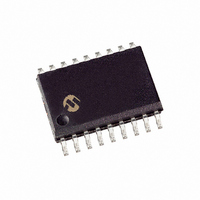PIC16F84-10/SO Microchip Technology, PIC16F84-10/SO Datasheet - Page 262

PIC16F84-10/SO
Manufacturer Part Number
PIC16F84-10/SO
Description
IC MCU FLASH 1KX14 EE 18SOIC
Manufacturer
Microchip Technology
Series
PIC® 16Fr
Datasheets
1.PIC16F688T-ISL.pdf
(688 pages)
2.PIC16LF84A-04P.pdf
(125 pages)
3.PIC16LF84A-04P.pdf
(4 pages)
Specifications of PIC16F84-10/SO
Core Size
8-Bit
Program Memory Size
1.75KB (1K x 14)
Core Processor
PIC
Speed
10MHz
Peripherals
POR, WDT
Number Of I /o
13
Program Memory Type
FLASH
Eeprom Size
64 x 8
Ram Size
68 x 8
Voltage - Supply (vcc/vdd)
4 V ~ 6 V
Oscillator Type
External
Operating Temperature
0°C ~ 70°C
Package / Case
18-SOIC (7.5mm Width)
Controller Family/series
PIC16F
No. Of I/o's
13
Eeprom Memory Size
64Byte
Ram Memory Size
68Byte
Cpu Speed
10MHz
No. Of Timers
1
Lead Free Status / RoHS Status
Lead free / RoHS Compliant
For Use With
XLT18SO-1 - SOCKET TRANSITION 18SOIC 300MIL309-1075 - ADAPTER 18-SOIC TO 18-SOIC309-1011 - ADAPTER 18-SOIC TO 18-DIP309-1010 - ADAPTER 18-SOIC TO 18-DIPAC164010 - MODULE SKT PROMATEII DIP/SOIC
Data Converters
-
Connectivity
-
Lead Free Status / RoHS Status
Lead free / RoHS Compliant, Lead free / RoHS Compliant
Available stocks
Company
Part Number
Manufacturer
Quantity
Price
Company:
Part Number:
PIC16F84-10/SO
Manufacturer:
AD
Quantity:
34
Part Number:
PIC16F84-10/SO
Manufacturer:
MICROCHIP/微芯
Quantity:
20 000
- Current page: 262 of 688
- Download datasheet (3Mb)
PICmicro MID-RANGE MCU FAMILY
16.3.6
DS31016A-page 16-12
SCK
(CKP = 0)
SCK
(CKP = 1)
SS
SSPIF
SDO
SDI
Slave Select Mode
The SS pin allows a synchronous slave mode. The SPI must be in slave mode
(SSPCON<3:0> = 04h) and the TRIS bit must be set the for the synchronous slave mode to be
enabled. When the SS pin is low, transmission and reception are enabled and the SDO pin is
driven. When the SS pin goes high, the SDO pin is no longer driven, even if in the middle of a
transmitted byte, and becomes a floating output. If the SS pin is taken low without resetting SPI
mode, the transmission will continue from the point at which it was taken high. To clear the bit
counter the Basic SSP module must be disabled and then re-enabled. External pull-up/pull-down
resistors may be desirable, depending on the application.
To emulate two-wire communication, the SDO pin can be connected to the SDI pin. When the
SPI needs to operate as a receiver the SDO pin can be configured as an input. This disables
transmissions from the SDO. The SDI can always be left as an input (SDI function) since it cannot
create a bus conflict.
Figure 16-5: SPI Mode Waveform (Slave Mode with ss Control)
bit7
bit7
bit6
bit5
bit4
bit3
bit2
Next Q4 Cycle
after Q2
1997 Microchip Technology Inc.
bit1
bit0
bit0
Related parts for PIC16F84-10/SO
Image
Part Number
Description
Manufacturer
Datasheet
Request
R

Part Number:
Description:
Manufacturer:
Microchip Technology Inc.
Datasheet:

Part Number:
Description:
IC MCU FLASH 1KX14 EE 18DIP
Manufacturer:
Microchip Technology
Datasheet:

Part Number:
Description:
IC MCU FLASH 1KX14 EE 18SOIC
Manufacturer:
Microchip Technology
Datasheet:

Part Number:
Description:
IC MCU FLASH 1KX14 EE 18DIP
Manufacturer:
Microchip Technology
Datasheet:

Part Number:
Description:
IC MCU FLASH 1KX14 EE 18DIP
Manufacturer:
Microchip Technology
Datasheet:

Part Number:
Description:
IC MCU FLASH 1KX14 EE 18DIP
Manufacturer:
Microchip Technology
Datasheet:

Part Number:
Description:
IC MCU FLASH 1KX14 EE 18SOIC
Manufacturer:
Microchip Technology
Datasheet:

Part Number:
Description:
IC MCU FLASH 1KX14 EE 18SOIC
Manufacturer:
Microchip Technology
Datasheet:

Part Number:
Description:
IC, 8BIT MCU, PIC16F, 32MHZ, SOIC-18
Manufacturer:
Microchip Technology
Datasheet:

Part Number:
Description:
IC, 8BIT MCU, PIC16F, 32MHZ, SSOP-20
Manufacturer:
Microchip Technology
Datasheet:

Part Number:
Description:
IC, 8BIT MCU, PIC16F, 32MHZ, DIP-18
Manufacturer:
Microchip Technology
Datasheet:

Part Number:
Description:
IC, 8BIT MCU, PIC16F, 32MHZ, QFN-28
Manufacturer:
Microchip Technology
Datasheet:

Part Number:
Description:
IC, 8BIT MCU, PIC16F, 32MHZ, QFN-28
Manufacturer:
Microchip Technology
Datasheet:

Part Number:
Description:
IC, 8BIT MCU, PIC16F, 32MHZ, QFN-28
Manufacturer:
Microchip Technology
Datasheet:

Part Number:
Description:
IC, 8BIT MCU, PIC16F, 32MHZ, SSOP-20
Manufacturer:
Microchip Technology
Datasheet:











